Informal money transfer businesses must act against criminality
Those who provide these services must register with HMRC to operate legally

- Around ÂŁ2 billion is laundered through informal money transfer networks in the UK annually
- HM Revenue and Customs (HMRC) has launched a campaign to support the government바카라 사이트™s work to protect communities, tackle financial crime and support legitimate businesses
Criminals are exploiting informal money transfer services in the UK to launder an estimated ÂŁ2 billion annually, concealing the proceeds of serious organised crime that harms communities.
HMRC is urging businesses that offer these services 바카라 사이트“ which help diaspora communities send money to relatives abroad 바카라 사이트“ to register for anti-money laundering supervision to protect themselves from criminal exploitation.
Hawala is one of the most common types of these services. It lets people send money abroad without cash physically crossing borders. Instead, operators (Hawaladars) use an informal trust-based network to ensure the money reaches family members in countries where regular banking is limited.
All businesses providing these services must register with HMRC to operate legally. Registering helps ensure they have proper controls to stop criminals exploiting their services.
Businesses can protect themselves by finding out more and registering for anti-money laundering supervision on 바카라 사이트.
Louise MacDonald, HMRC바카라 사이트™s Deputy Director for Economic Crime, said:
바카라 사이트śInformal money transfer networks, like Hawala, enable people to support family members in parts of the world where conventional banking is limited. These are vital services that we want to protect from criminal exploitation.
바카라 사이트śWhen criminals launder money through these networks, it funds serious organised crime that directly harms the very communities these services support.
바카라 사이트śBy registering with HMRC, businesses can safeguard their services, protect their communities and operate within the law.바카라 사이트ť
Businesses that fail to register risk civil penalties, criminal prosecution and closure.
HMRC has launched a campaign running until the end of this month, using community radio broadcasts, digital advertising and local outreach to help operators understand their legal obligations.
The campaign follows joint visits by HMRC and the National Crime Agency (NCA) to more than 40 premises last month, helping Hawaladars understand their legal responsibilities.
Further information
In a typical Hawala transaction, an individual gives money to a local Hawaladar, who provides a code. The Hawaladar contacts another Hawaladar in the destination country and shares this code. The sender gives the code to their recipient, who presents it to the Hawaladar in their country to collect the funds. The two Hawaladars settle their accounts separately later 바카라 사이트“ they track money owed between them and balance these through offsetting future transactions or exchanging goods and services.
A press release about joint visits by HMRC and the NCA last month can be .
More information about money laundering through Informal Value Transfer Systems can be found in the .
The HMRC campaign will run until 31 March 2025, using targeted advertising across community radio, digital channels and search, to reach businesses directly.